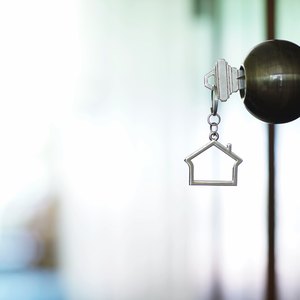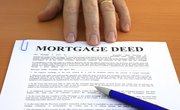
So you bought a house, and you signed a lot of documents at the closing. Years have passed, and suddenly you realize you need copies of your mortgage loan documents. Mortgage papers are fairly easy to obtain, and you have a number of options available to you for acquiring copies. You can get copies from the title company, your mortgage company, any attorneys involved in the transaction or from the county where your property is located.
Tips
Mortgage documents are public record. If you can't get copies from the mortgage company or the title company, you can always head to the register or recorder of deeds for the county where your house is located and obtain copies there. You may have to pay for copies from the county, but the mortgage lender must provide you with copies at no charge as long as you make a formal written request sent to the proper address.
What Is a Mortgage?
You may hear people talking about paying on their mortgage or owing money on a mortgage. In truth, a mortgage and a loan are separate. When you borrow money to buy a house, you take out a loan from the lender. You sign a promissory note, sometimes just called a note, promising to repay the loan pursuant to the agreed-upon terms. You then sign a separate document called a mortgage, which is an instrument that gives the lender a security interest in the property you're buying. The mortgage itself is not a promise to repay the money; that's what the note is for. The mortgage shows the world that you've agreed the bank can have a lien on the property.
A mortgage typically contains all the terms of your agreement with the lender, but it also includes the legal description of the property, which is often a paragraph or more describing the metes and bounds – that is, the boundaries of the property as determined by survey. Legal descriptions are difficult to read, but they often end with a recitation of the actual property address. The legal description may also contain a history of ownership, listing the prior deeds and their recording locations.
The Effect of a Recorded Mortgage
After you execute the note and mortgage when you buy a house, the bank or the title company will need to record the mortgage. The mortgage will be recorded with the register of deeds (sometimes called the recorder of deeds) for the county in which the property is located. When the mortgage is brought to the recorder, the person recording it pays a fee, and the document is stamped with a date and time. The mortgage will be kept in a book of mortgages, and the stamp will also include the book number and page number where the mortgage is kept.
The recording puts the world on notice that the mortgage is there. If you later want to borrow money from someone else and that new lender wants a mortgage, the new lender will run a title search on the property and see that another mortgage is already there. The new lender's mortgage will be behind the existing mortgage in priority. If a mortgage is not recorded, it's not enforceable against subsequent mortgages.
Deeds are also recorded and stamped by the county and kept in a book of deeds.
Buying a House: The Closing
When you buy a house, all the documents necessary to complete the purchase, including the mortgage, are executed at closing, or settlement. At that point, the title company has run a title search and figured out everything that needs to be paid from the sale in order to pass you a clear title, including prior mortgages, property tax liens and judgment liens. The closing may occur at the title company's office, the mortgage broker's office, an attorney's office or your realtor's office. Some lenders allow closing via electronic signature, while others require wet ink signatures. You will be given copies of all closing documents on the day of closing, and you should keep them in a secure place.
List of Mortgage Closing Documents
Mortgage closing documents include:
- The deed transferring title of the property to you.
- The note.
- The mortgage.
- The closing disclosure (prior to Oct. 3, 2015, this form was called a HUD-1 Settlement Statement).
- The initial escrow statement, if your mortgage payment includes property taxes and/or insurance.
- A loan estimate (prior to Oct. 3, 2015, you would receive a good faith estimate and a truth in lending disclosure).
- The affidavit of title signed by the seller.
- Transfer tax declarations, if applicable.
- The title insurance commitment.
- Additional disclosures required by the title company.
Getting Copies of Mortgage Papers
You should receive copies of everything you sign at the closing before you leave that day. Take them home and store them in a safe location where you can easily find them again if you need them.
If you lose your documents for whatever reason, though, you can still access the records from other sources, including the mortgage company, the title company and maybe even your realtor. If you only need copies of the deed and the mortgage, you can obtain these from the county where your house sits.
Contacting the Mortgage Company
Your mortgage lender should have copies of the mortgage, the note and many other closing documents. Your state's law may require mortgage lenders to keep copies of all the records, and under federal law, they are required to respond to requests for information from the borrower.
You should request the copies in writing, and send the request to an address specified by the lender or servicer for information requests. If you send the request to the wrong address, it may be ignored. You can find the address on the lender's website or on your monthly statements, or you can call the lender's customer service department and ask for the address to send information requests. You can also ask what should be included in the letter.
Overall, be as specific as possible in your request, and include as much information in your request as you have available. At the very least, provide your name, the property address and the loan number or account number, and detail what documents you're requesting. Make sure you use the name used on the mortgage documents; if you changed your name for whatever reason after buying the house, the original records are in your previous name. If you're not sure, include both.
In your written request, explicitly state that you want copies of your recorded mortgage. A mortgage is recorded once it's been taken to the county and processed, and it will have a recordation stamp on it that shows the date it was recorded as well as the book and the page number. You can also ask for other loan documents, such as your application paperwork and a copy of the note.
The mortgage company is required to respond to any conforming written request for information without charging you for the time or the paper.
Contacting the Title Company
The title company that insured title when you bought the property should have copies of all the closing documents available. They may or may not charge a copying fee. If you don't have a record of who did the title work, you can contact your realtor, who should be able to point you in the right direction. If you have no access to the title company, you can contact your county land records office, which would be either the register of deeds or recorder of deeds, to obtain copies of the deed and mortgages.
County Recorder or Register of Deeds
All mortgages, deeds and other land records are taken to the county register of deeds or recorder of deeds (these are two terms that mean the same thing). These documents are public record and are available to anyone who wants to view them and obtain copies of them, as long as you have the property address and/or the owner's name. The clerk's office will only have recorded documents, however. You can get copies of your mortgage and your deed here, but you generally won't be able to get copies of the note or any of the other closing documents from the county.
Searching for Records Online
The recorder or register of deeds for your county may keep its land records online. You can perform an Internet search for your county recorder of deeds or register of deeds, or for your county land records. These record searches don't always provide mortgage document PDFs. Sometimes you can view them only as TIFF or JPEG files, and they often have a watermark across the front to indicate that they're not official copies. Other counties may only have information available online and not actual copies of the documents.
For example, if you live in Wayne County, Michigan, you can find the Wayne County Register of Deeds online and search property records there, but you may or may not be able to view documents. Delaware County, Pennsylvania, allows you to search for online records, but you can only obtain copies from the recorder of deeds in person. Bexar County, Texas, on the other hand, will allow you to freely view documents online without a watermark.
Not all online property record searches allow you to search by address; most will allow searches by name, and most will allow searches by block and lot number. Additionally, online records often only go back a certain number of years. If your mortgage and deed were executed decades ago, the records might not be available online.
If you don't have the legal description of the property available and therefore don't know the block and lot number, or the online search will not allow you to download the documents, or your records aren't available online for whatever reason, you can go to the recorder's office in person.
Searching for Records in Person
If all else fails, you can head down to your county clerk's office and perform a search in person at the register or recorder of deeds. The clerk can help you find the records you're looking for either by address or name (in some cases, you still might need the block and lot number). The clerk will typically charge fees for both the search and the copies you make of any documents you want to take home; if you want certified copies, the charge will be more.
Most fees are charged by the page, or as an upfront fee plus extra per page over a certain number. Some counties will not perform searches at all and will only provide copies of documents that you can already identify, so bring as much information as you can about the mortgage so that you can find the documents more easily.
References
- Mortgages | USAGov
- Consumer Financial Protection Bureau: What is a Mortgage "Closing?" What Happens at the Closing?
- Consumer Financial Protection Bureau: What Documents Should I Receive Before Closing on a Mortgage Loan?
- Home Buying Institute: What Happens On Closing Day?
- Wayne County Register of Deeds: Land Records Search
- Delaware County Recorder of Deeds: Online Access
- NOLO: Home Buyers: What Documents to Expect at Your Close of Escrow
- Consumer Financial Protection Bureau: Requesting Information from Your Mortgage Servicer
- Consumer Financial Protection Bureau: How Do I Dispute an Error or Request Information About My Mortgage?
- Bexar County Clerk: Real Property/Land Records
Writer Bio
Rebecca K. McDowell is an attorney focused on debts and finance. She has a B.A. in English and a J.D. She has written finance and tax articles for Zacks and eHow.

